By: Rick Landers
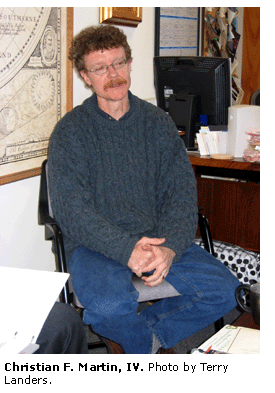 The headstock of a Martin guitar proudly announces that it has been an American tradition since 1833. Seven generations after the small guitar company was established in New York, before migrating to the village of Nazareth, Pennsylvania, the Martin company’s mark is recognized around the world as a benchmark for instrument excellence.
The headstock of a Martin guitar proudly announces that it has been an American tradition since 1833. Seven generations after the small guitar company was established in New York, before migrating to the village of Nazareth, Pennsylvania, the Martin company’s mark is recognized around the world as a benchmark for instrument excellence.
Ownership of the family business has passed down from men with the initials C.F.M for over 170 years and may continue with a new C.F.M., Claire Francis Martin, who recently arrived to adorn the family tree and share her name with the latest new Martin guitar that is a petite, and appointed with toy-like building blocks with her initials.
Claire’s father, Christian F. Martin IV, took the reigns of the Martin Guitar Company in 1986 at a time of tumult and employee dissatisfaction. Chris came on board armed with a degree in business from Boston University and an appreciation for not only quality management, but participatory management. It was a time when the company needed more than a strong manager, the Martin Guitar Company needed a leader.
Under Chris Martin’s leadership the Martin plant size has doubled and he has overseen operations when not only the 500,000th Martin was made, but held court when the finely crafted and highly ornamented 1,000,000th Martin was polished and made ready to play.
Chris opened the door for Martin’s line of celebrity Signature and Limited series Martins that carry the names of such luminary musicians as Hank Williams Sr., Johnny Cash, Cathy Fink, Marcy Marxer, Paul Simon, Rory Block, Woody Guthrie, Roger McGuinn, and Eric Clapton, along with models honoring the younger crowd of fine guitarists like Jonny Lang and Kenny Wayne Shepherd. Each guitar carries along with its Signature name the honor of bestowing a portion of its sales to a favorite charity of the artist.
met Chris as he was arrived at the plant in Nazareth smiling and ready for work unlike most American company executives, dressed in hiking boots, blue jeans, and a backpack slung over his shoulder.
******
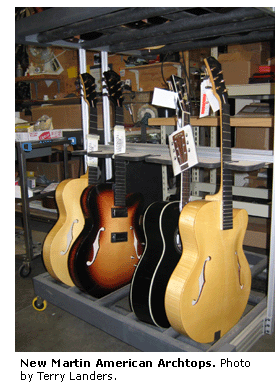 Rick Landers: During the past year, Martin guitars were rated as the world’s number one choice for acoustic guitars. How did that make you feel?
Rick Landers: During the past year, Martin guitars were rated as the world’s number one choice for acoustic guitars. How did that make you feel?
Christian F. Martin IV: I don’t know, good question. I guess it just verified what we like to think here. It’s that we’re trying to make the best of its kind. And so maybe this validates what it is. We are doing so much more volume today, even with all of those competitors out there.
Rick: To what do you attribute the quality of Martin guitars?
Christian: My coworkers. Basically, they hold the company to an extraordinarily high standard. I think, partially, we allow them to and we encourage them to. And they feel like, okay, I’ve been told that I work for a company that makes the best of its kind. I’m part of this special thing and I think that’s why it happens. We encourage them to do the best work they can and they’re like, “Oh, okay!”
Rick: Did you pick that up in business school?
Christian: I did. It was serendipity that it was a point in time, at least for me anyway, that in business school when they were beginning to come up with a lot of data that showed that businesses are going to survive and prosper better if you talk to the people that do the work.
And I think that it was obvious because for many years American businesses were failing because they ended up with this huge gap between the people making the decisions and authorizing the spending. Plus, I saw that here, you know, we were very hierarchical we had just walked into a pool of molasses and couldn’t get out of it.
Rick: Where did you go to school?
Christian: I started out at UCLA and worked in a music store in California. My parents were divorced and I didn’t grow up in the business and I felt really foolish. Here I am in a music store, young Mr. Martin and not having the background.
So, I quit school came back to Nazareth and moved in with my grandfather and worked in the plant for about a year and a half, then went to the local community college. And picked up some of those credits at night that got me feeling that, okay, college won’t be this endless thing.
Then I went to Boston University and the nice thing about BU was they have an undergraduate business school. I didn’t have to get a liberal arts degree and then get an MBA. I didn’t want to wait that long. So, I went to BU and after 4 years I had enough business dumped into my head that I had a better understanding of it.
Rick: Was it a foregone conclusion that you would someday take the helm of the company?
Christian: No, not at all! My mom did not communicate with my Dad. I would come to visit two weeks in the summer, then usually stay with my grandparents, and it was fun. We’d go to the shop plant and push wood off the saws, stuff like that, corny things.
But it never really clicked with me. My mother never encouraged me. She was so estranged from the Martin side of the family. My father was President and my grandfather was Chairman and the Chief Executive Officer.
I was close to my grandfather. Not so close to my father, so I didn’t feel a connection with him. And I think my grandfather was sort of like, because he only saw me periodically, “Well, I’d better see how this goes because if I push too hard I may lose him.”
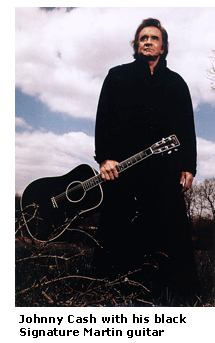 Rick: Where did you see your life headed?
Rick: Where did you see your life headed?
Christian: I was going to be a marine biologist, because I thought, “Wouldn’t it be fantastic to go to Florida, the University of Miami and scuba dive all day.” I was like, “I could do that.”
Then for some reason, during one summer, I decided to come and stay with my Dad , his third wife and my sister Robin. One day I watched a guitar being made under the guise that I wanted to build my own guitar. So what would happen is that no one wanted to be the one in the plant that handed on my bad work to the next person.
They would take the guitar that I was working on and they would demonstrate how to do the work and they’d hand me some reject D-18 and let me try it. More often than not, I would screw things up.
But it didn’t really matter. My guitar was perfect, I didn’t make it, but I did watch it being made. And I still do that. I still go out and periodically, when I buy a guitar, I watch it being made.
Rick: Are they’re made the same today?
Christian: You don’t get this on the tour, but every fixture in the place is newer than when I did that 30 years ago. The product is the same if not better. The operations in some cases have been taken apart and rather than trying to simplify for lack of a better term, a complex operation, instead we said, let’s break down this operation to its component pieces and look at each part of the process and improve that. From that, we have separate fixtures, rather than one contraption that was never quite integrated.
Rick: You’ve invested in a lot of capital improvements over the years.
Christian: We hadn’t been investing in our core business. When my Dad was in the business, he invested in areas, made some acquisitions that didn’t work and they drew a lot of capital away from the core business.
So the crafts people kept trying to make the fixtures they operated work. It took us a while to finally realize what had occurred. We went out and would find a fixture with a piece of Popsicle stick taped on it to make up for the wear that occurred. God bless them. If we wouldn’t build them a new fixture, they were going to make them work one way or another!
I can make this endless, but the worst thing that happened was one attempt to automate. You haven’t been on the tour yet, but when you go down to the machine room floor you’ll see some pretty sophisticated woodworking machinery. Because that’s where we make the parts.
You could buy complex woodworking machines thirty years ago, but they were five million dollars. We couldn’t afford them. We were a smaller company and the machines were much more expensive.
Today they’re a half-million dollars. That’s still a lot of money, but today you can buy ten for the price of one. You need the volume and once you have that, you need the machines. So, we would hire engineers, who wouldn’t talk to the people who did the work.
Management would say that we have identified a need to automate neck carving, instead of using draw knives. Great. We went to Allentown and found some job shop guy who said, “Cool, I’ll build you a neck carving machine.”
And not once, not twice, but at least three times, these large Rube Goldberg-like contraptions showed up that were going to automate different parts of the operation. None of them worked.
We spent all the money, but didn’t talk to the people who were going to be affected. So, they’re not cooperating. They’re all standing around and like, “Okay, show me.” And when it didn’t work, well that was part of the reason we were unionized.
They just saw management as incompetent. And to make matters worse, they left these stinking machines on the shop floor. Monuments of management ineptitude.
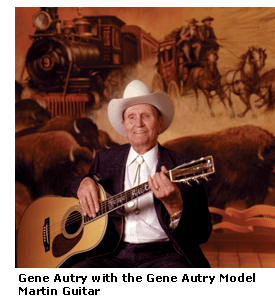 Rick: What was the college kid thinking?
Rick: What was the college kid thinking?
Christian: I was going to college and I would come back during summers. Bouncing in and out, watching this and scratching my head wondering “What’s going on here?”
When things were going good back in the 1960s and 1970s we could make mistakes and get away with it. Then the guitar business was just so good. But once the business dipped in the late 70s and early 80s, you couldn’t make those kinds of mistakes, you couldn’t afford it.
Rick: You had some better ideas?
Christian: Yes and no. I had a lot better understanding of what wasn’t working, than what would work. I didn’t really have a clear idea of what would work. I went to Boston University and took a class in organizational behavior and they talked a lot about involvement.
Plus, there was a lot of discussion in the literature like Harvard Business Review, Forbes, Fortune and others. What helped me was when I eventually became CEO, when my grandfather died, that’s when I realized, oh, my gosh, now I’m supposed to lead this company.
Rick: How did you steer a new course?
Christian: One of the things I thought about and something I’d always wanted to go to was Outward Bound. I recalled some kind of executive training that Outward Bound had. So, I got the brochure and sure enough there it was.
So I signed up for a week in Colorado. I went to Boulder, bought some polar-tek underwear and showed up to this place where they were going to pick us all up.
It was me and a whole bunch of other people I didn’t know that were pretty much my age. They were mostly middle level managers and a couple from the military. They had been encouraged to go. The military said, look you have an opportunity here but you’re a little rough around the edges.
Most of the other people went because someone from their organization had encouraged them. I guess telling them that if they wanted to get ahead they needed to polish themselves. So, I got thrown into that and that was where they taught me that cooperation got things accomplished. And, we were perfect strangers. They also taught me that cooperation just doesn’t happen.
Rick: How have you leveraged your Outward Bound experience?
Christian: I go to Outward Bound every year with my colleagues. One of the teambuilding exercises is a class example for me.
 Rick: With your colleagues from Martin Guitar?
Rick: With your colleagues from Martin Guitar?
Christian: Yes. My colleagues are very enthusiastic, but we all need some training about what we are doing. So, we met with the instructor who told us we were going sailing the next day, but that first they wanted to try something out on us to see where we were all coming from. And they said, “The initiative team is here and it needs to get to the other side of the field. Everybody has to get there.” Then they handed out blindfolds.
Now, I’ve been to Outward Bound twenty times and I often say very little. Because I could lead the witness and say, “Hey, I’ve done this before and this is how it works.”
There’s lots of screaming and yelling, everybody’s talking, okay, and saying “We agree, we agree.” The initiative the team is here it needs to get to the other side of this field everybody has to get there. We put the blindfolds on and everybody races across the field. I get ten steps out and I’m scared to death and I stop.
The instructor comes over and asks me if I’m trying to make a point. I say no, I’m scared to death. They forgot about me with all their screaming and enthusiasm.
But, after a week of Outward Bound you realize that you really need consensus here, before we begin the initiative. And that’s one of the reasons I keep doing it. It helps me share that one thing that happens at Outward Bound. It’s that intense version of a much longer process.
Rick: Martin Guitar has a room with competitors’ guitars available for employees to play?
Christian: We buy competitive products. We bring them in to benchmark. We also do benchmarking trips to local dealers.
I’ll go out with the Quality Assurance Techs where we usually stop at one or two specialty shops, boutique shop. Generally we’ll go to Philadelphia or New York. It’s to show my colleagues what we are up against and we see that in the boutique shops. They’re all making fine guitars.
And then I show them what were up against at Guitar Center, when there are 300 guitars on the wall, all the strings are dead, they all have scratches, some of them are $99 and some are $3,399.
Rick: Do your low end guitars get the same quality control scrutiny as the premiere D-45s?
Christian: They really do. And that’s an issue for us as the cost of doing business in the America increases the viability of what you just called our low end products. That’s a concern to us. They are treated exactly the same as the more expensive guitars.
They do have less ornamentation and there is a way to make them more affordable that way. But, when they have the same amount of labor, on issues like the internal aspects, there are no savings. I’ve said to people who are thinking of buying a D-15 that it’s the best bargain in the world. It’s a D-45 without pearl inlay. You know, it’s the same guitar.
Rick: How do you maintain the integrity of the Martin tradition while introducing innovation?
Christian: Right now we have the luxury of having the X-series that has no history. So we can do whatever we want with that. I think that it can be a platform that might be very different some day and still be called the X-series. And then we have the 16s. If someone would go back in our history book and say there’s a 16, the interesting thing is that every so often it was a different guitar.
It’s not like the D-28. You can look at a D-28 and say, okay, this thing hasn’t changed much. But the 16, you can look at a different era, it’s been a different enough thing, and it still looks like a Martin but then it kind of turns left and then turns right.
I encourage my colleagues to be very cautious, about fooling around with the D18, the D28 and the HD28. Let’s be very careful. Because, we get into discussions about tooling and fixtures, about making the process better, more streamlined, more accurate. And there are certain geometrical aspects of the traditional design of a Martin guitar that fly in the face of engineering logic.
The engineers will say, and this is something we did and a lot of people may not know this, but on the upper bout on the dovetailed guitars where they join have a very subtle curvature. Well, the curvature has to be maintained in the block and also in the neck itself and it’s so subtle, yet it is extremely challenging to get it right because it is not flat.
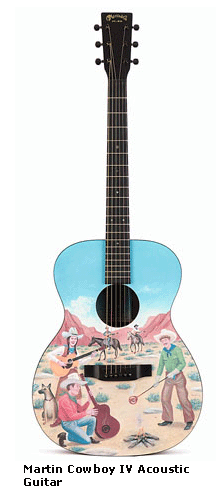 Rick: All Martin Guitars share this feature?
Rick: All Martin Guitars share this feature?
Christian: We have some more affordable guitars where that area is flattened out, because it simplifies the assembly, particularly attachment of the neck and the body by a magnitude of whatever. It’s not twice as easy, it’s a whole other world.
The old traditional joints give you the optical illusion, occasionally, that they are actually sinking in. By bowing it the way my ancestors did either consciously or unconsciously of saying, in some classic sense, you’ve seen the pillars that you see in Rome and how they actually bow out and come back in?
Well, they did that on the old guitars. And when they didn’t do it you can see it immediately. How did they know to do that? Obviously they did. And I don’t want to change that. Somebody said, “Chris you know if we flatten them all out we could make them all so much easier.” I said, “No, you can’t, don’t screw with that.”
Rick: Do you play guitar?
Christian: You know I wanted to [Laughs]!
When my parents divorced I got a 5-18. I was twelve years old and I took some lessons. I just wanted to learn a few chords. I was going to summer camp and the guy I took lessons from found out who I was and I later learned he said to himself, “I will create the next Segovia.”
I had a nylon stringed guitar that my father and my grandfather got me and this guy has my one foot on a stool, thumb on the back of the neck, Mel Bay scales in front of me. I didn’t practice. It didn’t inspire me at all!
Rick: A lot of us have been through that drudgery.
Christian: I learned how to read music and I could play but was never really able to learn to improvise. And I talked myself out of continuing, I don’t always admit it, but I’m actually more comfortable on the piano than on the guitar. I feel kind of awkward about that and feel like the GM executive who doesn’t drive a car!
But, I can come at it from a different perspective than the 300 employees who do play guitar. So, I can say “Great, but I look at it differently.”
Rick: You’re no longer the President of Martin?
Christian: No, I had inherited the presidency from previous the president who went out on a disability. And so there was a period for a time when I was Chairman, CEO and President. When I took over it was a $16M a year company and we did $80M last year.
Rick: How did the company transition to a new President?
Christian: I actually spent some time with an executive coach and she put me through a raft of tests and she sitting there with me and said, “Chris, you’re an idea man,” and I kind of liked that view and agreed and thanked her.
Then, she said, “You’re kind of an entrepreneur even though you’re sixth generation, but you’re not really good at the day-to-day stuff, even though you’re trying to be good at it. Something’s not working.”
Rick: Just not a good total fit?
Christian: The part that was working was getting overwhelmed by the other and I was feeling like I needed help. So, I went to the Board and we all agreed to bring in a President.
Keith Lombardi began with us about two years ago. He has experience with bigger companies. And he has a very personal connection to the company because his father was a rabid Martin guitar fan and his sister still is. He told us he grew up around Martin guitars and said, “I get it.”
Keith was the only one, when the personnel manager and I went to have lunch with him, where we looked at each other knowing “he got it.” All of the others came in saying, “So, you want to turn around this thing and you need to fix it.” And we were like, “No! We don’t want anyone turning this around and turning it on its head. We need to keep the momentum going! You’re not allowed in here, it’s not broken.”
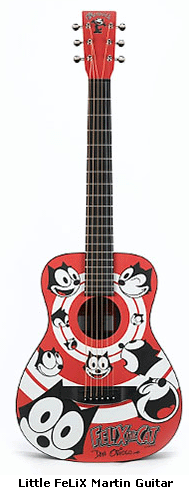 Rick: So, what’s your job here?
Rick: So, what’s your job here?
Christian: My job now, I just had a daughter and I just had a pretty significant medical issue. So, my job first of all is to love my new daughter and take care of myself, and then make sure this thing continues to grow. In my past, I didn’t have to deal with my health or my child. I had one colleague tell me, “Chris, Martin Guitar was your child and if it had a problem you nurtured it.”
So, now my job is evolving into something where I’m still hopeful that I’m perceived as the leader, but not as much on a day-to-day basis. I give a lot of authorization to dream, within parameters. I’ve said to people, “Look, I want us to do some different stuff, but let’s not forget all of those stinking dreadnaught copies out there that shouldn’t be theirs, they should be our sales! It bugs me a little bit when I see dreadnaught copies, because I say to myself, “We should have had that sale.”
It wasn’t that long ago that I saw a guitar from the Orient and I was like, “Thank God! It’s about time!” It was a Taylor copy! The shape of the bridge and the shape of the pick guard were the same! He (Bob Taylor) needs somebody to copy him. [LAUGHS] So, we have Keith as President now and I’m going to be the Chairman until I die, maybe not the CEO.
Rick: Martin Guitar has contributed a lot to charity as a part of your Artist Series.
Christian: That aspect of our charitable giving I’ll tell you about. The company also gives locally that is not funneled through the Artist models. We have a company foundation and the foundation funds initiatives that are guitar related. For example, we give to “Sing Out” and to Godfrey Daniels. And the foundation sponsors a guitar design course at the local community college.
The Artists’ models charitable contributions connection came from me trying to figure out how not to get to the point where people would say, “Oh yeah, Martin’s paying them to play that guitar or call Martin and they’ll give you a free guitar.”
That happens in some other guitar companies. Maybe not first tier ones, but the second tier because they are not Martin, or Fender or Gibson. I didn’t want to go there, but our public relations people were saying, “We need endorsements, we need endorsements!”
I was like, “When Paul McCartney goes on TV and he’s using a Martin guitar, people know it.” But, we can’t say it without his permission. You can because you’re a guitar magazine. And I was really befuddled by this. I just didn’t want to open up the dam and have this become some wild thing that someday became the thing I didn’t want it to be.
Rick: What turned it around for you?
Christian: Well, I always wanted to see Gene Autry’s D-45. And so I went and visited my friend Matt in California and went to the Gene Autry Museum. Have you been there? It’s half a collection of real cowboy kitsch stuff from the sets and the other two-thirds is real authentic arts and crafts, a real old authentic gun collection and I’m not a gun guy, but it’s awe inspiring with the old six-shooters, and spurs, and saddles. I’m like, “Oh, My God. I had no idea, this is a real museum.”
Rick: What about Mr. Autry’s D-45?
Christian: Then we get to this section and I think his stuffed horse is there and the his saddle. And there’s the guitar, kind of in the background, the first D-45, a little dusty, but there it was and so, I saw the first D-45. So, we’re leaving and we go to the gift shop and there’s all this Gene Autry stuff, the little pen knives, the lunch boxes, and I walked out wondering.
I came home and I called the museum and got in touch with Joanne Hale who’s in charge of the museum. Joanne’s the wife of a fairly famous singing cowboy, Monty Hale, who happened to own a Martin D-76.
I asked, “What do you think about us reproducing Gene’s guitar and we’ll donate the first one to the museum and we’ll take some of the proceeds from the sale of Gene Autry models and donate that to the museum?”
I realized that Gene was still alive and didn’t need the money, he was really rich and money wasn’t going to trip his trigger. But, he endowed this museum and Joanne said, “I’m going to call him.” She called and talked to his wife, and she talked to Gene who thought it was a great idea.
Rick: What a great new Martin tradition.
Christian: Well, yes, but Joanne said that I needed to call Mrs. Autry because she didn’t think the percentage I came up with was appropriate! [Laughs] So, we did a little horse trading and that was the template that Dick (Boak) uses.
And you know what? Most of these artists have foundations or they have favorite charities. To a person they’ve been like, “What a cool idea!”
They don’t need any more money. Money doesn’t excite them anymore. For them to be able to say they have a partnership with Martin Guitar and part of the proceeds for the sale of their limited edition is going to their favorite charity, well, it really works.
Tweets that mention Interview With C.F. Martin IV | Guitar International Magazine -- Topsy.com (13 years ago)
[…] This post was mentioned on Twitter by Matthew Warnock, Guitar International. Guitar International said: Interview With C.F. Martin IV http://bit.ly/cCqYkJ […]
mississippi (13 years ago)
A very nice article. I really enjoyed reading it.
I’ve only played 2 Martin guitars that were in guitar stores and they were both under ¥50000、$500.00 I wished I had the money I said to myself
Publisher (13 years ago)
Yeah, Martin builds great guitars. Some get very expensive, but you can sometimes find those that are more affordable. Either way, they’re always well built and sound great.